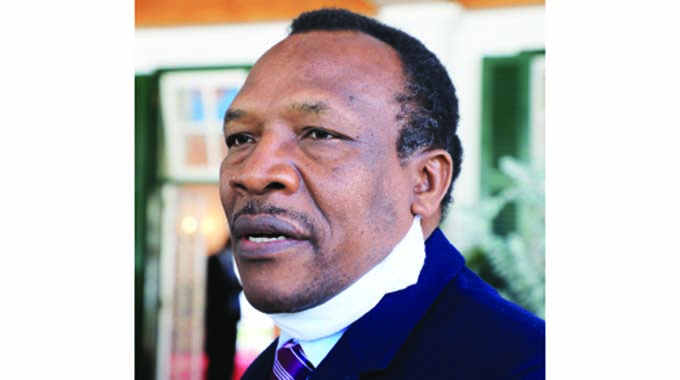Free Zimbabwe from illegal sanctions — envoy

Fungi Kwaramba The Interview
President Mnangagwa has made international re-engagement, fighting corruption and achieving Vision 2030 his major priority areas. Our Political Editor Fungi Kwaramba (FK) sat down with Tanzanian Ambassador Professor Emmanuel Mbennah (EM) to get his views on the efforts that Zimbabwe has made so far. Below are excerpts of the interview.
FK: Tell us about the bilateral relations between Zimbabwe and Tanzania.
EM: Relations between Zimbabwe and Tanzania go back to many years of friendship and cordial relations. We have supported Zimbabwe from the early 1960s when the liberation struggle was starting here in Zimbabwe. We hosted the liberation movements of Zanu PF and other movements in Sadc. The relationship has grown over the years and I look at the Second Republic and congratulate President Mnangagwa for the work he has done, he is focused on developing the country and fighting corruption. He is working very hard.
FK: What has it been like fighting corruption in Tanzania, any lessons for Zimbabwe.
EM: When President Magufuli came into power in 2015, in line with the Chama Cha Mapinduzi constitution, he established a special court to deal with corruption in order to make sure the culprits are not only arrested but are also duly punished. The President set that court and people who are caught in corruption are prosecuted with a sense of urgency. I am seeing this here in Zimbabwe. I really commend President Mnangagwa for the works he is doing. He is focused on the progress of the country, obviously, the challenges are not few but he is working very hard. Some things that I can identify with Tanzania is the ardent fight against corruption. There is no regard for the (position) of the people. It does not matter who it is, if anyone is found on the wrong side of the law action is taken, people are arrested and taken to court and that is very much what Tanzania has done especially during the tenure of President Magufuli. Corruption is a problem in many countries and leadership is doing everything to make sure they do not mince their words and I commend the President for that.
FK: The two countries have very strong political and historical relations. How do we transform this into strong economic ties with benefits to both sides?
EM: Political ties are very strong historically. They will continue to be strong. I don’t have any doubts about that. The political ties that we have created opportunities in which we have stronger economic co-operation. Zimbabwe has a lot to offer. You have people who have experience in tobacco, dairy farming, mining and there is tourism both here and in Tanzania. We can have different collaborative efforts in order to maximise the economic benefits. Tanzania is a big country. We are talking of about 60 million people. That is almost four times Zimbabwe. There are a lot of areas to invest in, industry, education and in terms of opportunities for Zimbabweans to invest in Tanzania it’s unlimited. Kiswahili (spoken by a large population in East Africa) is one of the things we can bring here. We can bring teachers and start to have KiSwahili as the languages of Southern Africa.
FK: Tell us more about the importance of a shared language, in this case Swahili?
EM: In Tanzania we have many tribes, people speak their languages but basically you have one African unifying language which brings its own benefits of identity and solidarity. Language contributes to the identity of the people. KiSwahili brings the same advantages to the region in that we will be unified as a people with one identity. Yes, we have these boundaries that were set by the colonial people but they will increasingly become artificial boundaries because people will become one, united by the same language. There is a need to become a stronger Africa by speaking a common language.
FK: SADC has stood with Zimbabwe against the illegal sanctions that were imposed by some Western countries. What role is Tanzania playing in amplifying that message?
EM: The sanctions are illegal and they have no legal basis to be there. The sanctions are immoral and there is no moral justification for them to be there. There are causing pain to so many people needlessly without any benefit. They are just not right and they are a source of pain for people who are already having some other forms of pain caused by droughts. In my country we are on the frontline of saying this is inhumane. How can people do this to other people? You punish a wrong, you punish a mistake, what wrong has Zimbabwe done to be put under this? It’s wrong. The international community should continue to put pressure on countries that have imposed the sanctions because they are wrong.
FK: Related to that, tell us about your views on human rights because countries that have imposed these illegal sanctions are wont to refer to that. What are your experiences in Tanzania?
EM: Human rights, is one of those terms that people can decide to use very loosely. They will have their own definitions of human rights on the basis of own expectations and interpretations. Tanzania, like Zimbabwe fully observes and is committed to the promotion of human rights for everyone regardless of gender, political persuasion or colour. Tanzania believes in the equality of all human beings, right to dignity and treatment. We want to see stability, peace and equal space for everyone to prosper. But Tanzania wants to be Tanzania because people want to bring their own philosophies and by those philosophies they define also what human rights are. When we talk of issues of sexual orientation, who says it is a human right to love a person of the same sex? That is a mind-set of some people and for us it is not a human right. Sometimes there is the wrong understanding of the definition of human rights, even freedom. What is freedom? Do I have the freedom to kill someone? The freedom to abuse. Is it freedom for me to use my pen, my training to destroy something because I am free? Is that it? What about the dignity of the other person? The welfare of the other person. So I think it is a question of definition.
FK: How has Tanzania handled the global pandemic that is Covid-19?
EM; Covid-19 is a global pandemic. Not any one country has been spared but in Tanzania Covid-19 did not have much impact because life continued, except that international flights were suspended at some point. Now they have been resumed, some movement was restricted, not lockdown per-se and because of that life continued. However, the sectors that required external interaction, tourism and trade, those were impacted but now those restrictions are being lifted. People can now come to Tanzania for safari in tourism.
FK: What is your view on the measures that were implemented by the Zimbabwean Government in dealing with the pandemic?
EM: I think the response is very wise. The response is very clear; it is a balance of things. Initially, they was total lockdown because you would really want to learn about the pandemic. Now with additional knowledge of how the pandemic spreads, President Mnangagwa said let us go to level 2. Certain essential services are going on but under restrictions. The Government is considering all the necessary factors and then charts out a way forward. There is leadership and there is success. The deaths could have been very high for a pandemic that is new but the Government has done very well.
FK: Your impressions about the Second Republic on its efforts to revive the economy and international re-engagement?
EM: The efforts are very clear. They are very significant and very much in the right direction. Re-engagement is very necessary. I can see the European Union coming closer and even the United Kingdom. The recent lifting of sanctions on banks and the John Deere deal will bring substantial agricultural output. All these are fruits of re-engagement. The effort is very clear, its bearing fruit. I would like to congratulate the President for that. On the economic front, the efforts are very clear, the Government is unwavering in making sure that the economy improves. The auctioning of the currency every Tuesday allows for the impact of the market forces to determine the value of the Zim-Dollar; these are the right efforts to make.
FK: Any last words to Zimbabweans?
EM: The President and the Government are committed to seeing this nation succeed and my call to the people of Zimbabwe is to rally behind the President because he means well for the country. Success will come. We can see signs but that requires support from everyone including those in the opposition. In Tanzania we have opposition parties but it is very clear that people in the opposition consider Tanzania first, we may have different ideas and different ideologies but we are here to give everything to the development of the country, my appeal to the people of Zimbabwe is build Zimbabwe, don’t pull it down, you don’t have another Zimbabwe, building means building, you cannot be destroying one side and say you are building. There are a lot of things I see on social media that are destructive, that will not take Zimbabwe forward. Patriotism should come to every Zimbabwean and then hard work. This country has a lot of hard workers. Zimbabwe has bright people, very educated people, within and outside. If people put their heads together, Zimbabwe will be a shining star not only in the region but internationally. My appeal to Zimbabwe is keep working hard and for everyone to stand behind the President. The opposition should also contribute towards building Zimbabwe. We need to be wise in dealing with those who purport to be our friends. They are only friends because they want to benefit. There are so many good friends that Zimbabwe can count on and not those who are working against the Government.







Comments